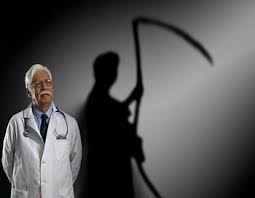According to the latest data from Statistics Canada, 2,614 Canadians chose death by euthanasia or physician assisted suicide between January and October, 2018. This is a fivefold increase in people choosing to die with the aid of healthcare professionals since medical assistance in dying (MAiD) was legalized in June, 2016. This statistic does not include Quebec, Northwest Territories, Yukon Territory and Nunavut. The number of assisted deaths in Quebec since legislation was enacted before the rest of Canada in December, 2015 until March, 2018 is 1,664. At the national level but excluding Northwest Territories, Yukon Territory and Nunavut, the total number of medically assisted deaths from December, 2015 until October, 2018 is 6,749. A safe assumption is that yearly totals will greatly increase in 2019 and beyond as society normalizes euthanasia and physician assisted suicide.
The laws that determine eligibility for MAiD are set to expand thanks to the federal Liberal Party but the provision of euthanasia and physician assisted suicide remains with each provincial government. Granting legal protection for healthcare professionals who conscientiously refuse to participate in MAiD lies within the jurisdiction of provincial governments. Canadian doctors who are unwilling to provide assisted suicide and euthanasia must refer patients to a physician who is willing. Nurses and other healthcare professionals are likewise required to fulfill a patient’s request for referral. For example, as outlined in the College of Nurses of Ontario Standards of Practice, a nurse in Ontario who conscientiously objects to taking part in in medical assistance in dying must transfer care of the patient to a nurse who does not object. This is a form of participation in MAiD and is unacceptable. Those of us who refuse to refer patients for MAiD are subject to professional disciplinary action which may result in the suspension or loss of our licence to practice in our chosen professions.
Within the first few weeks of legalization, a patient with many physical, emotional and spiritual challenges asked me to find her a doctor who would assist her to die. After a hasty silent prayer, I asked her why she wanted this. She poured out all her distress and I explained that her physical and emotional concerns would be addressed. Her spiritual needs were equally important. A baptized Catholic who left the Church many decades ago, I reminded her of God’s unconditional love and promised her I would pray for her. With this reassurance, she wept uncontrollably as I held her. Until she died of natural causes a few months later, she never again spoke of medically assisted death.
Since that fateful day, some patients have asked for information on euthanasia and assisted suicide or for help in finding a doctor who will provide aid in dying. Other pro-life individuals who work in healthcare services face similar situations. Although we are required to cooperate with laws and professional regulations concerning provision or referral for MAiD, we do not comply, regardless of the absence of legal conscience protection. Instead, our solution is to address the reasons why our patient wants to die and present alternative solutions. Medical assistance in dying is the worst option for our patients and is morally reprehensible to us.
With the protection of conscience rights and therefore the right of refusal to participate in euthanasia and physician assisted suicide, medical care for the sick and the dying will greatly benefit. The numerous complex reasons why our patients want to die can be thoroughly addressed and viable alternatives that respect life can be explored. Stronger advocacy and lobbying for increased access and improvements in the delivery of palliative care will encourage further research into state-of-the-art care for the dying. Physicians, nurses and other healthcare professionals will be unencumbered to give hope and comfort to those who feel they have no other choice but medically aided death. We will be better equipped to help families who are conflicted and devastated by their loved ones’ desire for euthanasia or physician assisted suicide. There will be respect for healthcare professionals’ moral and religious beliefs which in turn assures committed, compassionate, excellent care for patients from conception to natural death.
In 2017 and 2018, a small group of doctors and nurses participated in the Call for Conscience Campaign in the Archdiocese of Toronto. Despite explaining the need for conscience protection at many different parishes over the Lenten season, support was less than we hoped. In the first year, only approximately 30,000 Catholics from Canada’s largest archdiocese signed letters to provincial and federal politicians in support of conscience protection. The following year, the Call for Conscience Campaign expanded to other Ontario dioceses but the total number of signed letters increased by only 20,000 more supporters. Perhaps if Catholics better understood that conscience protection ensures the availability of practitioners who will defend their life and provide uncompromised ethical care, support would be much greater.
This is why we cannot stop fighting for the protection of conscience rights of doctors, nurses and others who work in all healthcare related fields. We must continue to speak out and demand changes to existing laws, government policies and professional regulations because in the end, legislation that protects the moral and religious beliefs of healthcare professionals who disagree with medical assistance in dying fundamentally protects all patients.

